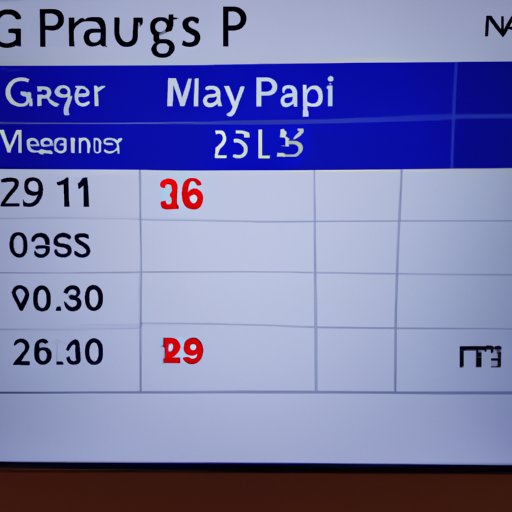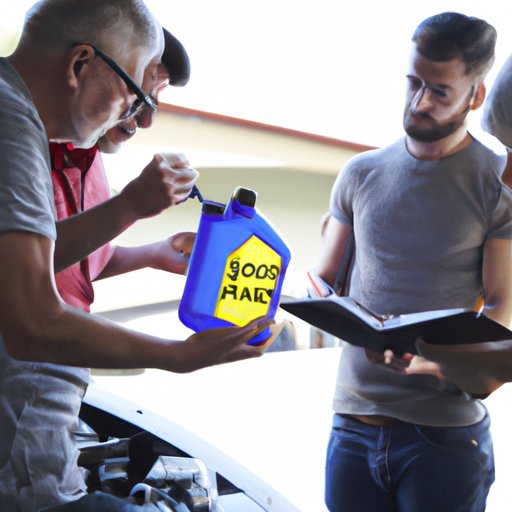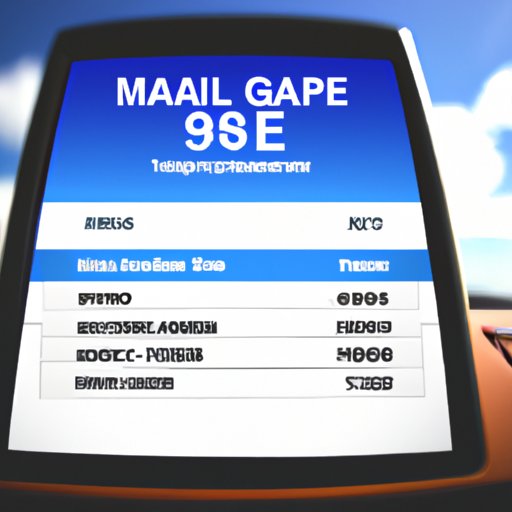Introduction
Calculating gas mileage is an important skill for anyone who travels frequently or likes to save money on fuel costs. Knowing how to calculate gas mileage can help you plan trips more effectively and maximize your fuel efficiency. This article provides a step-by-step guide on how to calculate gas mileage for a trip.
Overview of the Problem
Gas mileage, also known as fuel economy, is a measure of how far a vehicle can travel using one gallon of fuel. It is usually expressed in miles per gallon (MPG). The average vehicle gets about 20 MPG, but this varies depending on the type of vehicle and driving habits.
Purpose of the Article
The purpose of this article is to explain the basics of calculating gas mileage and provide a step-by-step guide on how to calculate MPG for a trip. It will cover topics such as understanding MPG, fuel consumption and efficiency, the formula for calculating MPG, examples of calculations, tips for maximizing fuel efficiency, and how to use an online calculator to estimate fuel costs.
Outline the Basics of Calculating Gas Mileage
Before you can calculate gas mileage for a trip, it’s important to understand the basics of how gas mileage is calculated. Here are some key concepts to keep in mind.
Understanding Miles Per Gallon (MPG)
Miles per gallon (MPG) is a measure of how many miles a vehicle can travel using one gallon of fuel. It is typically expressed as a ratio, such as 30 MPG. The higher the MPG, the more fuel-efficient the vehicle is.
Fuel Consumption and Efficiency
Fuel consumption is a measure of how much fuel a vehicle uses over a given period of time. It is typically expressed as gallons per 100 miles (GPM). The lower the GPM, the more fuel-efficient the vehicle is. Fuel efficiency is a measure of how efficiently a vehicle uses fuel. It is typically expressed as a percentage.

Explain the Formula for Calculating MPG
The formula for calculating MPG is simple: divide the total number of miles traveled by the total number of gallons of fuel used. This will give you the MPG for your trip. For example, if you drove 200 miles and used 10 gallons of fuel, your MPG would be 20 (200/10 = 20).
Breakdown of the Formula
In order to calculate MPG for a trip, you need to know two things: the total number of miles traveled and the total number of gallons of fuel used. To get the total number of miles traveled, simply add up all the miles you drove during the trip. To get the total number of gallons of fuel used, you need to fill up your tank before and after the trip and subtract the amount of fuel remaining in the tank at the end of the trip from the amount of fuel in the tank at the beginning of the trip.
Estimating Fuel Costs
Once you have calculated the MPG for your trip, you can use this information to estimate the cost of fuel for the trip. To do this, simply multiply the total number of gallons of fuel used by the current price of fuel. This will give you an estimate of the total cost of fuel for the trip.

Show Examples of Calculating MPG for a Trip
Now that you understand the basics of calculating MPG, let’s look at some examples of how to calculate MPG for a trip.
Sample Calculation of MPG
Let’s say you drove 400 miles and used 20 gallons of fuel. To calculate your MPG for the trip, simply divide the total number of miles (400) by the total number of gallons (20), which gives you an MPG of 20 (400/20 = 20).
Tips for Maximizing Gas Mileage
In addition to calculating MPG for a trip, there are several strategies you can use to maximize your fuel efficiency and minimize your fuel costs. Some of these include car maintenance, driving habits and techniques, and tracking fuel usage and consumption.
List Tips for Maximizing Gas Mileage on a Trip
Here are some practical strategies for improving fuel efficiency and minimizing fuel costs on a trip.
Strategies for Improving Fuel Efficiency
One way to improve fuel efficiency is to ensure your vehicle is running properly. This means regularly checking the oil and air filters, replacing worn spark plugs and tires, and keeping the engine tuned. In addition, it’s important to avoid sudden accelerations and decelerations, as this can lead to decreased fuel efficiency.
Tracking Fuel Usage and Consumption
Another way to maximize fuel efficiency is to track your fuel usage and consumption. This can be done by monitoring your fuel gauge or keeping a log of your fuel purchases. By tracking your fuel usage and consumption, you can identify areas where you can improve your fuel efficiency.
Demonstrate How to Use an Online Calculator to Estimate Fuel Costs
In addition to calculating MPG for a trip, you can also use an online calculator to estimate fuel costs. Here’s how.
Finding an Online Calculator
The first step is to find an online calculator. There are several available, such as the Fuel Cost Calculator from the U.S. Department of Energy. Once you’ve found a calculator, simply enter the required information (such as the starting point, destination, and estimated fuel economy of your vehicle) and click “calculate” to get an estimate of the fuel costs for the trip.
Using the Calculator to Estimate Fuel Costs
Once you’ve entered the required information, the calculator will give you an estimate of the fuel costs for the trip. This estimate is based on the current price of fuel and the estimated fuel economy of your vehicle. You can use this information to budget for your trip and make sure you have enough money to cover the cost of fuel.

Share Practical Strategies for Improving Fuel Efficiency
In addition to using an online calculator to estimate fuel costs, there are several practical strategies you can use to improve fuel efficiency and minimize fuel costs on a trip. Here are a few.
Car Maintenance Tips
Regularly checking the oil and air filters, replacing worn spark plugs and tires, and keeping the engine tuned are all important steps for improving fuel efficiency. According to a study by the U.S. Department of Energy, regular maintenance can improve fuel efficiency by up to 4%.
Driving Habits and Techniques
Your driving habits and techniques can also have an impact on fuel efficiency. Avoiding sudden accelerations and decelerations, avoiding high speeds, and taking advantage of cruise control can all help improve fuel efficiency. According to the same study, following these tips can improve fuel efficiency by up to 7%.
Conclusion
Calculating gas mileage for a trip is an important skill for anyone who travels frequently or wants to save money on fuel costs. This article provided a step-by-step guide on how to calculate gas mileage for a trip. It explained the basics of calculating MPG, showed examples of calculations, outlined tips for maximizing fuel efficiency, and demonstrated how to use an online calculator to estimate fuel costs. By following the steps outlined in this article, you can calculate gas mileage for any trip and maximize your fuel efficiency.
(Note: Is this article not meeting your expectations? Do you have knowledge or insights to share? Unlock new opportunities and expand your reach by joining our authors team. Click Registration to join us and share your expertise with our readers.)
